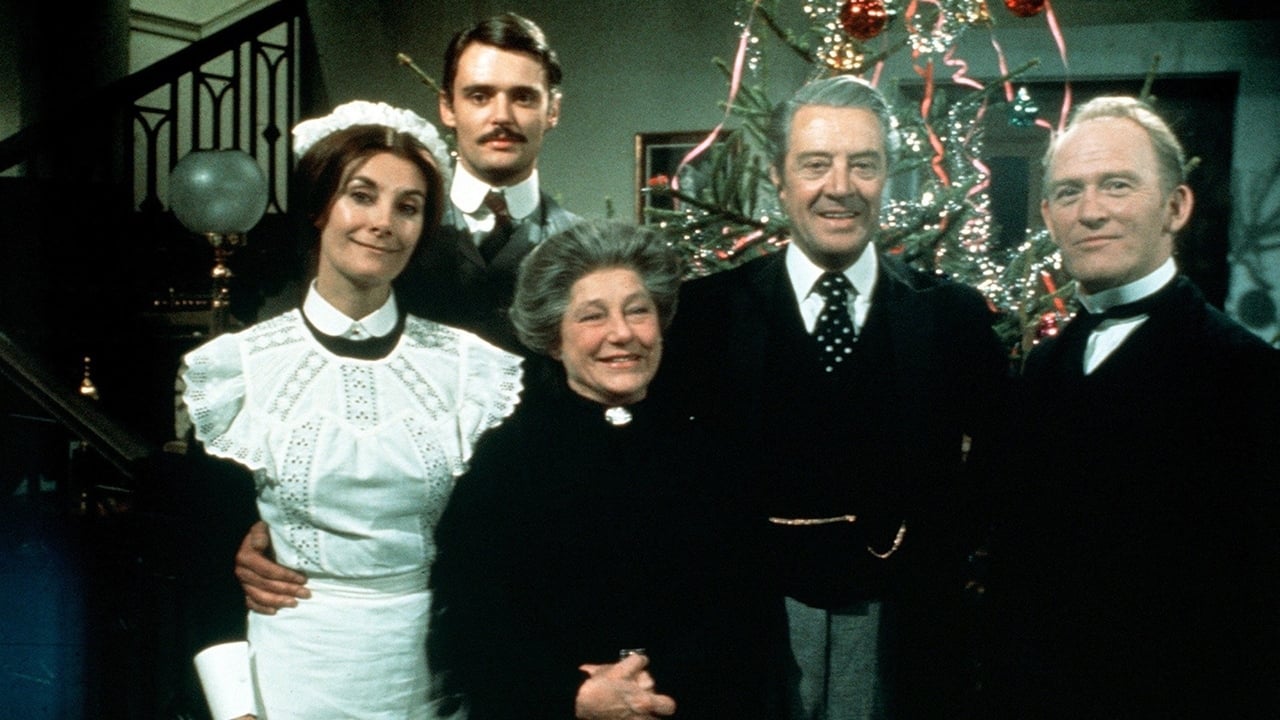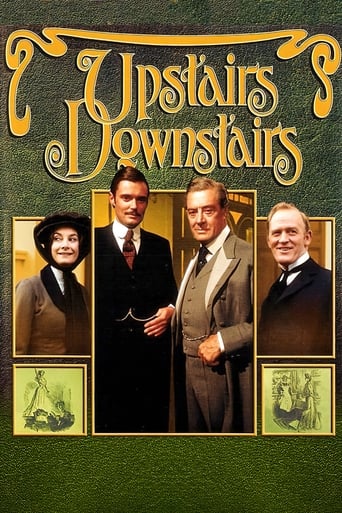

What a waste of my time!!!
... View MoreThis movie was so-so. It had it's moments, but wasn't the greatest.
... View MoreThe movie really just wants to entertain people.
... View MoreThis movie feels like it was made purely to piss off people who want good shows
... View MoreOne of the greatest dramatic series of all time, Upstairs Downstairs (U/D) is about life at 165 Eaton Place in Belgravia, one of the wealthiest neighborhoods in London. It reflects the tensions between masters and servants, between different categories of servants, and between the existing order and those who do not fully accept it--servants who aspire to careers outside of domestic service, persons motivated by middle-class values, and the nouveau riche who respect money and power more than tradition. Both upstairs and downstairs residents are influenced by British imperialism and xenophobia.The household is headed by Richard Bellamy (David Langton), the son of a clergyman, who has married Lady Marjorie, scion of the prominent Southwold family. As a political and social conservative, Richard attains high administrative offices, but, as a member of Parliament, he prefers to vote according to his conscience rather than the Southwold family's preferences. Lady Marjorie (Rachel Gurney) is imperious and aristocratic. Their son James (Simon Williams), an army officer, is plagued by such bad judgment that we generally cannot sympathize with him. His sister Elizabeth (Nicola Pagett) is idealistic and romantic, but unrealistic. Her relations with the male sex always turn out badly, until (having left U/D after Series 2) she is said to have found marital happiness in America. Following Marjorie's death, management of the household falls to James's new wife Hazel (Meg Wynn Owen), the daughter of an accountant, who is guided by different values than other members of the Bellamy family. Marjorie's niece Georgina (Lesley-Anne Down) arrives in Series 3, with a sense of idealism and adventure. After the war, Richard marries Virginia (Hannah Gordon), who provides companionship and support.The downstairs staff is directed by the butler, Hudson (Gordon Jackson), who relies on discipline to preserve traditional standards, and discretion to prevent scandal, but can be sympathetic when the occasion warrants. Mrs. Bridges (Angela Baddeley), the cook, overcomes kitchen crises and follows household gossip. Rose (Jean Marsh), the head house parlor maid, later ladies maid, is devoted to the family, but occasionally expresses dissatisfaction with her "place" in the system. Under house parlor maid Sarah (Pauline Collins) makes up in imagination what she lacks in education; anxious to escape domestic service, she becomes a chorus girl. Chauffeur Thomas Watkins (John Alderton) is something of a con-artist, but he evidently has genuine affection for Sarah. Under house parlor maid Daisy (Jacqueline Tong) marries footman Edward (Christopher Beeny) and attempts to advance his career. At the bottom of the servants' hierarchy is the kitchen maid Ruby (Jenny Tomasin).The stories deal with a wide range of subjects. Many episodes are connected to such real events as the death of Edward VII, World War I, the Silvertown munitions factory explosion, the 1926 General Strike, and the Stock Market Crash. The producers gave great attention to verisimilitude -for example, consulting with Buckingham Palace staff regarding protocol for hosting the king's visit to 165 Eaton Place.Many viewers consider Series 1 (1903-1909) U/D's least successful series. It had a lower budget than subsequent series; and, due to a technicians' strike, the first half dozen episodes were filmed in black and white. Writers, directors, and actors were still trying to set the parameters for the program. As a result, this series includes several strange stories; and some characters (especially the footman Alfred), lack credibility. Some performances are too loud, too demonstrative, and poorly choreographed. Many of the stories in Series 2 (1908 - 1910) provide various perspectives on marriage; others deal with problems created by a superannuated nanny and by Elizabeth's suffrage activities. King Edward VII is a dinner guest in one episode; and this series ends with his death. Series 3 (1912 - 1914) witnesses the arrival of Hazel Forrest as Richard Bellamy's secretary, and her marriage to James Bellamy. Lady Marjorie having died on the Titanic, Hazel assumes the management of the household. She eventually overcomes downstairs resentment; but her middle-class outlook leads to clashes with Richard and James. This series ends with the outbreak of World War I. The war casts a shadow over Series 4 (1914-1918), which many consider the best. The Bellamys take in a family of Belgian refugees, James Bellamy and footman Edward join the army, other members of the household take on war-related duties; and a local baker, of German descent, becomes a victim of anti-German hysteria. The war impacts the household in various ways--the staff must dine on ersatz meat and potatoes, James comes home severely wounded, and the house is hit by a bomb. Series 5 (1919-1930) deals with life in the 1920s. Richard finds happiness with his new wife Virginia. But old values are challenged, as the younger generation engage in wild parties and other reckless behavior. As a result of the stock market crash and the Depression, both upstairs and downstairs residents must leave Eaton Place to start new lives elsewhere.U/D's 68 episodes were the product of 9 writers and 8 directors—so there are some inconsistencies, and some episodes are better than others. But, overall, the performances are outstanding. By informal count, U/D was nominated for 17 Emmys and received 7, most significantly, 4 successive awards for outstanding dramatic series. It was nominated for 9 BAFTA awards and received 2; and was nominated for 4 Golden Globe Awards and received 1. It also received a Peabody Award, a Royal Television Society Award; and its theme song won the Ivor Novello Award for Best Theme From a Radio or Television Production. The program could have continued beyond five years, but the actors, writers, and directors chose to end it. Thus, there have been no further episodes of this outstanding drama.Christopher Hodson, who directed 14 episodes, described U/D as "the sort of series that doesn't come along more than once in a lifetime." Few would disagree.
... View MoreI loved this series the first time around and last watched it a few years ago when I bought it on VHS. I have since replaced the VHS tapes with DVD but have not yet gotten around to watching once more. This morning I caught most of the episode when the King came to dinner and it has me hooked all over again. When one knows a series, it's stories and it's characters so well there are lots of other things which catch one's attention. The superlative script and acting are brilliant - no-one can deliver a line like Gordon Jackson could. Everyone involved was perfectly cast as far as I could see, there was note an actor who did not completely inhabit their part. it is a lesson on how to make television - even though it was almost entirely studio-bound the viewer still got a feeling for the outside world and the events taking place there. The remake of this series had much higher production values but the casting was not always right and there were PC values applied which jarred with the viewer and a need to inject 21st century values to an Edwardian drama so it was not successful. If only the quality writing and acting could be applied to today's TV drama series then there would be success achieved that the original UD attained. TV studio bean counters take note. There is no substitute for quality.
... View MoreMany find history cold and uninvolving. It is the memory of others. To make it real, you have to give events an emotional core. I think this series is better at accomplishing that on a consistent basis than any that I have ever seen. History tends to play as Grand Opera, but the reason this series works is because it finds the link between individual responses to the mood of an era and the viewer's own "everyday" emotions. You connect with the mood; you are then invested in the whole household's responses to the events. I find that my memories of the series are tied up with my recollections of the events occurring in my own life at the time. They are mixed; I cannot separate them. It is more than "inviting them into your living room". There is a recurring intimacy available to TV that other media cannot access. Great TV realizes this. The other example that pops into my head is "Scenes from a Marriage", although it is more a pure emotional "history".If someone wanted to understand how England changed from the Edwardian world to the Great Depression, I would tell them to watch 10 episodes of "Upstairs, Downstairs" rather than read 10 history books.
... View MoreI would just like to say that Upstairs Downstairs has got to be one of my most favorite British Soaps of all time. It's such a shame that it had to end. The era is fascinating to me, and I really enjoyed the way the servants interacted with each other and the occupants of the household.The story lines were believable, as were the characters. And when the Titanic was mentioned as the cause of death to the first Mrs. Bellamy, it brought a sense of reality to the show.The whole premise of the show was brilliant, because I'm sure that was the ways it really was in those days. What with the class distinctions and all.Over all I truly enjoyed the entire production.
... View More